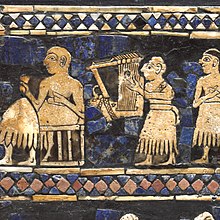

Lyres
1 By the waters of Babylon,
there we sat down and wept,
when we remembered Zion.
2 On the willowsa there
we hung up our lyres.
3 For there our captors
required of us songs,
and our tormentors, mirth, saying,
“Sing us one of the songs of Zion!”
4 How shall we sing the LORD’s song
in a foreign land?
 Greek vase with muse playing the phorminx, a type of lyre | |
The lyre is a stringed musical instrumentknown for its use in Greek classical antiquity and later. The word comes from theGreek "λύρα" (lyra)[1]and the earliest reference to the word is the Mycenaean Greekru-ra-ta-e, meaning "lyrists", written inLinear B syllabic script.[2] The earliest picture of a lyre with seven strings appears in the famoussarcophagus of Hagia Triada (a Minoansettlement in Crete). The sarcophagus was used during theMycenaean occupation of Crete (1400 BC).[3][4]The recitations of theAncient Greeks were accompanied by lyre playing. The lyre of classical antiquity was ordinarily played by being strummed with a plectrum, like a guitar or a zither, rather than being plucked, like a harp. The fingers of the free hand silenced the unwanted strings in the chord. The lyre is similar in appearance to a small harp but with distinct differences.
The word lyre can either refer specifically to a common folk-instrument, which is a smaller version of the professional kitharaand eastern-Aegeanbarbiton, or lyre can refer generally to all three instruments as a family.
The term is also usedmetaphorically to refer to the work or skill of a poet, as in Shelley's "Make me thy lyre, even as the forest is"[5] or Byron's "I wish to tune my quivering lyre,/To deeds of fame, and notes of fire"[6]


